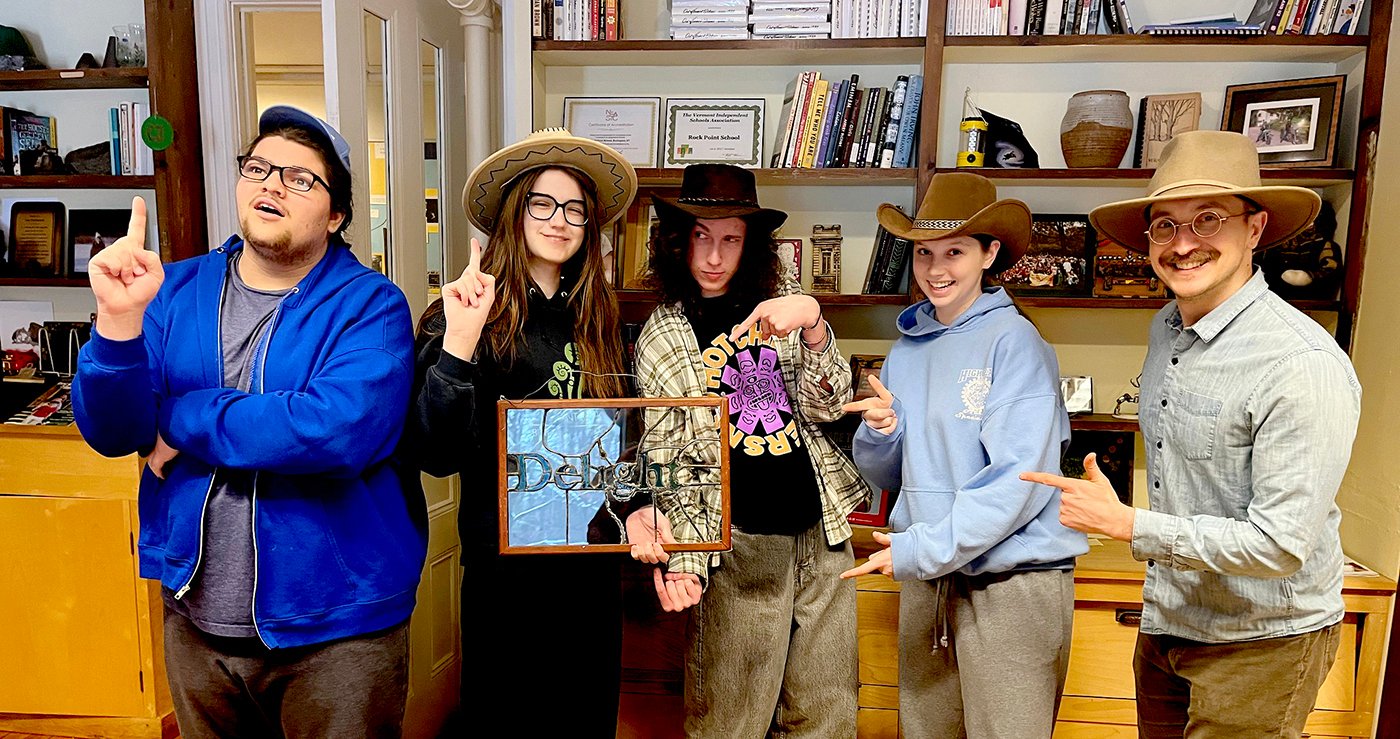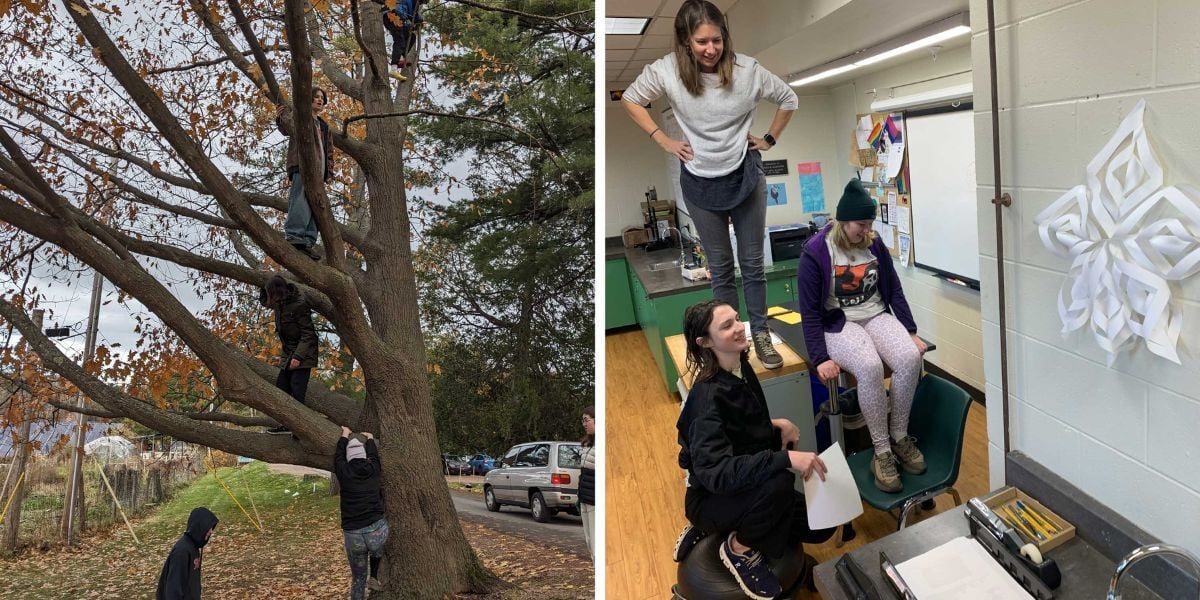How Friction Fosters Connection and Builds Community
In an age where “frictionless” conveniences like instant deliveries and AI interactions promise to make life smoother and easier, a lesser-known cost...


In the field of education, there has been a lot of research about the benefits of play-based education for preschool and elementary school students. It is accepted that young children learn everything from social skills to reasoning to math through play. As students get older, however, the benefits of play are emphasized less and academic pressure increases. But for high school students, play can be just as valuable to their learning as it is for elementary school learners.
Teens are at a precarious place between childhood and adulthood. They have one foot in each world. While their idea of "play” might be totally different than that of a preschooler, there are still many benefits to allowing teens the space to play in and out of the classroom.
Intellectual playfulness in the classroom might mean giving students options for creative assignments; incorporating theater exercises into a history unit; or giving them building challenges in Physics. Playfulness in the academic arena can also include an intention by both students and teachers to have an open attitude in their approach to learning, by keeping wonder and exploration in the forefront of their efforts. For the teen brain, play allows them to take risks without high stakes. Through these risks, they learn, make mistakes, and build resilience.
Psychologists David Elkind and Peter Gray define play as: choice in pursuits, self-direction in learning and exploration, engagement in imaginative creation, and all these things in a non-stressed state of interest and joy. With these as defining characteristics, we can see that play is something that can easily be incorporated into a high school classroom.
In English class, our teacher Abbey Baker recently helped students participate in the Vermont Young Playwright’s project. Students took part in acting and writing workshops where they played theater games, did writing exercises, and through this learned about the elements of playwriting. Then, students who were interested wrote and produced their own plays. Working collaboratively with their student actors and stage crew, they edited their work, picked their costumes, and built their sets. Through this process, the students are engaging in many elements of play and learning everything from executive functioning skills to writing skills to practical math. It’s a joy to see the fruit of their imaginations explode on the stage after weeks of effort and collaboration.
Researcher Sarah Fine highlights the concept of “intellectual playfulness,” noting that cognitive rigor and deep engagement are more likely to exist in classrooms where the playful aspect of learning is emphasized. Students become deeply engaged and invested in creative, open-ended, problem-solving activities. These “playful” activities are intellectually challenging or the students would not be engaged. While traditional education can focus on rote memorization, writing long research papers, or volumes of reading to indicate a “challenging” curriculum, many students become disengaged from that kind of learning.
Math class is often a place where traditional modes of learning (taking notes on concepts, doing problem sets, etc.) create passivity and lack of motivation in students. Many of our students arrive at Rock Point School with a math phobia, thinking they don’t like math because of this type of class in their past. Our math teacher, Solenne Abaziou, creates a “problem of the week” as a way to incorporate playfulness, risk taking, and intellectual rigor into her classes.
It is not uncommon to find students collaborating on the problem of the week in the lunchroom or lounge long after math class has let out. These problems are designed to be open-ended and can be solved by less skilled math students in one way and higher level math students in another, often leading students to teach each other their solutions. Students who have historically avoided homework are motivated to complete the problem of the week because it is fun and challenging. Solenne has written about this approach to encouraging persistence in math for Edutopia, where you can read more about it.
We know that for high school students, play can be just as valuable to their learning as it is for elementary school learners. We not only see the benefits of playful learning in the classroom, but as a boarding school, we see how it benefits students after classes are over as well.
High school students are under immense social pressure. Many experience high levels of anxiety around social situations, feeling like they have to look perfect, say the right things, be funny, be smart (but not too smart), and all of it may appear on social media for everyone to see. This kind of pressure can lead to young people withdrawing from face-to-face social interactions all together, or other unhealthy coping mechanisms.
“Free play” can break down the pressures that adolescents feel in social interactions. These playful interactions can increase social skills and confidence and naturally help students learn better emotional regulation and coping skills.
In our dorm program, staff members create opportunities for students to explore and play in ways that benefit their social and emotional development. Here are some of the classic “play” activities we see our students engaging in regularly:
Sledding/snow play - While this seems straightforward, sledding often leads to students building jumps together, trying out different tricks, cheering each other on, and getting a good workout. This is a low cost, low pressure activity that gives structure to social interactions.
Board games - Our students love playing everything from Monopoly to Settlers of Catan. These kinds of structured games allow for clear expectations in social interactions, giving a framework for students to make connections with one another.
Adventure-based games - Flashlight tag and capture the flag are popular games that can be played in the field or woods on campus. Students collaborate, problem solve, and work up a sweat together doing something less structured and stressful than soccer.
As more and more of our world goes digital, stepping away from phones and computers to play with your friends has many mental, physical, and emotional benefits. Play is good for all of us, not just for little kids!

In an age where “frictionless” conveniences like instant deliveries and AI interactions promise to make life smoother and easier, a lesser-known cost...

As we are heading into our vacation, I am thinking about a student at Rock Point from many years ago who really struggled to get back into the school...

Every quarter, students choose from several electives, which meet three times a week to supplement the curriculum and provide a fun way to start...